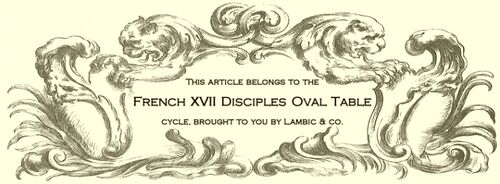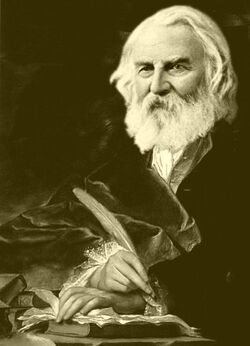Henry Whatsyourname Longfellow
“Good ole' Whatsy never dared to quote me.”
Henry Whatsyourname Longfellow (born 1612 in Edinburgh (Scotland), died 1690 in Portland (US-to-be)) was a talented poet, a virtuoso bagpipe player, and also an outcast Scotsman, since he didn't belong to a clan. Paris (France) being the cultural capital of Europe during the XVIIth Century, he decide to try his luck there.
Gloomy Scotland[edit]
From writing to piping[edit]
Haggish and sheep, sheep and whisky, whisky and cabertossing, cabertossing and haggish... this wasn't a life for the sensitive Henry Whatsyourname, nicknamed "Whatsy". He preferred to write poetry, and learn languages. Well, one language at least: French. He even translated the complete works of Walter, Igor, Ludwig, Leopold, Ingrid, Adolf and Moritz Shakespeare into French, which went unnoticed because he also translated the authors' name as Guillaume Secoue-Javelot. His only, handwritten copy was taken to France by an interested but not-so-honest merchant, where it fell in the hands of a young Molière.
His poetry wasn't very popular with the Highlanders, but happened to cross the borders, probably the same way his translation did. It even earned him an invitation from the Empress of Thong, calling on him (and on his poetry) for a lifelong stay in Skid Valley. He would have loved to go, but, alas, couldn't afford the trip. Didn't know where it was either: rumour had it that the Flemish Pirate Jean Bart had been there, but nobody actually believed that. Discouraged, he took to playing the bagpipe, and even bought a complete Highlander outfit. This purchase wasn't overly appreciated by his countrymen, since he didn't actually belong to any clan, and had to improvise his colours, in order no to be considered an impostor. He had to take very secret private bagpiping lessons, and that wasn't easy. Ever heard a discrete bagpipe? Neither have I.
Chucked out[edit]
When eventually found out, he was thrown out of Scotland immediately, with bagpipe, outfit and all. Since England wasn't the place to be when armed with a bagpipe, France was the only way to go. Longfellow had been a quick learning pupil, and a decent bagpipe player could add some colour to the Royal Orchestra, known for its repertoire of exotic music. He paid the ferry fee a very original way: he promised not to play any bagpipe, except with very misty weather, to warn other ships and avoid collisions. He even earned some extra pocket money, replacing the prow figure that had gone lost during the last tempest. This, of course, he had to do in his Highlander outfit. When he finally set foot on French territory, the outfit was all messy and torn, so he had to dress like an average Frenchman. The bagpipe was in a regular shape, since he hadn't had to carry it while acting as a prow figure.
Gay Pahree[edit]
Piping away to Paris[edit]
On his way to Paris, he earned his daily slice of bread with little rat-catching jobs. Well, actually, that was what the village mayors expected him to do when they hired him, bearing in mind the successes of the "Pied Piper of Hamelin". In reality, our Longfellow chased the rats, making them run in front of him, terrorized as they were by the sounds emerging from his instrument. That made him arrive with ever bigger herds of rats in each subsequent village, where they paid him to get rid of their rats, as well of the rats he brought with him. Upon his arrival in the centre of Paris, the rats all found their way to the city's sewage system, and have been propagating there ever since. Henry got rid of his "army", and could prepare for his audition for the Royal Orchestra.
Longfellow meets Lully[edit]
Although bagpipes weren't totally unknown to Jean-Baptiste Lully, the Conductor and Artistical Director of the Royal Orchestra hadn't actually seen one before. He liked the look of the instrument, and thought of it as a visual novelty. But... although Lully had already heard of bagpipes, he'd never heard one. And that's when he started to doubt about the usefulness of it during His Majesty's meals... Finally, the looks did it, and Lully ordered the Court's Instrument Maker to make a downscaled copy of the bagpipe. Henry Whatsyourname Longfellow could begin his career in the Royal Orchestra.
Another Disciple[edit]
Lully was quite impressed by Longfellow's musical skills, and so was Molière, the Kings playwright. Having both a word to say in the composition of the French XVII Disciples Oval Table, they lobbied to bring the musician in too.
Longfellow the Piping Poet[edit]
Once established in Paris, his poetry emerged again. So did his memories of the invitation to Skid Valley. After a visit from the Disciples' Muse, he wrote the famous "Empress of Thong" limerick:
There once was an Empress of Thong who enjoyed a good go on a dong. She liked to be quick on cocks that were thick and also on those that were long.
A lost and found manuscript[edit]
When at the Second Convention of 1671 Molière brought with him the "Secoue-Javelot" manuscript, Longfellow couldn't believe his own eyes. When he told Molière who was the author of the original English version (and who was the translator!), Molière couldn't believe his own ears. After having checked their respective senses, they became friends for ever. That is, till Molière's tragical passing away on stage.
Off to the Colonies[edit]
Shocked by Molière's theatrical death in 1673, Longfellow didn't want to stay in France, and, aged 61 (!), he took off to the French Colonies in America. Residing in a simple log cabin in Portland, he dedicated the rest of his life to the translation of Molière's works. According to the XVIIth Century habit of translating the author's name along with the text (remember, he did the same with Shakespeare), the works were published as the "Complete Works of J.B. Booty"[1]. No wonder his translation went unnoticed...
References[edit]
- ↑ Needless to say (what's this footnote doing here then?) that this fictitious Booty has nothing to do with the real Booty Dynasty, which members all have the A.B.S. initials anyway.



